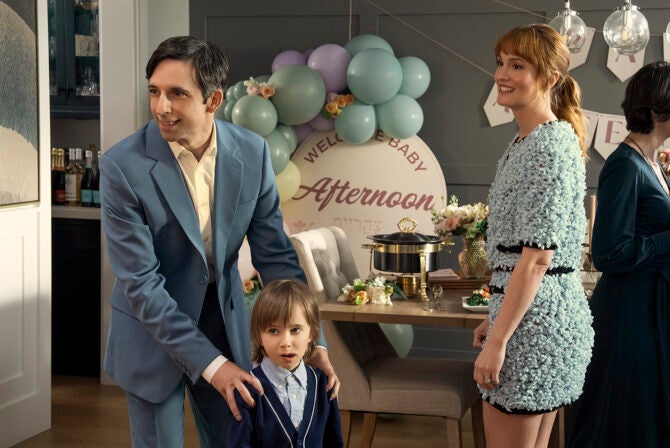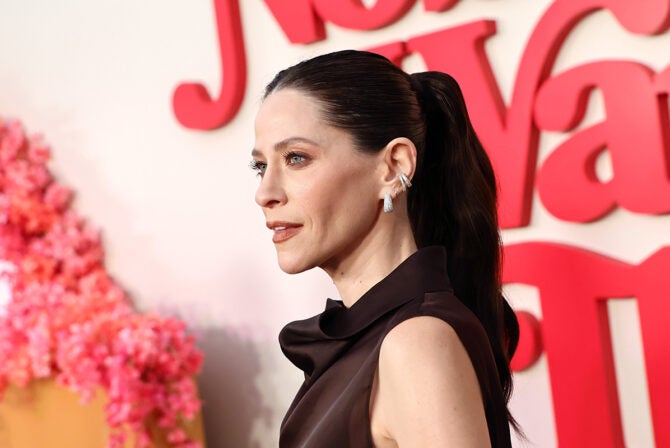Oh no, not again.
I was sitting in synagogue when an all-too-familiar feeling washed over me. I felt the tears stinging my eyes, the urge to ugly blubber rising to the surface.
I cannot make a spectacle of myself in shul again. Hold it together, Rachel.
But how could I? The rabbi was giving his pre-Yizkor sermon, the speech given before the traditional communal prayer to memorialize deceased family members.
“You’re a link in a chain,” he repeated throughout his speech, reminding us all of the very Jewish idea that we must remember the past in order to build a better future. We memorialize those lost so we can teach our children the lessons previous generations taught us, continuing the chain of our peoplehood.
Except I will never be a link in a chain. Three years ago, after a five-year-long battle with infertility, my husband and I put a necessary end to our path to parenthood — the right decision for us, but an endlessly painful one nonetheless. We’re connected to the past, sure, but the chain ends with us.
The universally understandable grief over a child we dreamt of, but never came to be, is only a part of the total picture. There’s also the grief of feeling like I lack a place in the very community that raised me. The grief of invisibility. The grief of not getting to write the next chapter of a story I thought I’d be part of. Of not being counted.
Even if our story had ended differently, infertility in the Jewish community comes with a pain that runs deeper, because it touches not just our personal dreams, but our place in the collective. Family forms the very fabric of our faith, and anyone who’s struggled to build the family they want can’t escape the constant reminders of their struggle.
Stories of infertility permeate the Torah, hand-in-hand with near-constant rallies to “be fruitful and multiply.” Synagogue events center around children, with Tot Shabbats and Teen Minyans galore. And nothing brings a community together quite like a bris or baby naming or a meal train for a new mom.
These are beautiful parts of Jewish life. But they can also be brutal reminders. For the 1 in 6 people who face infertility or difficulty carrying a pregnancy — and the many others who struggle to build a family for any number of reasons, from being LGBTQ+ to facing illness or financial obstacles — these features can highlight a painful reality: You don’t belong here.
And too often, that painful reality is reinforced not by what’s said, but by what isn’t. When rabbis deliver sermons about parenthood without acknowledging those in the pews who are desperately trying to get there. When community programming assumes everyone has children, or is partnered, or is on the same path. When shul newsletters celebrate every baby naming but never make space to acknowledge pregnancy loss, failed treatments or chosen childlessness. When the first question members ask is, “How many kids do you have?” These are moments that sting, and they add up.
That pre-Yizkor sermon wasn’t the first time I’d cried in synagogue when faced with these painful reminders; it likely won’t be the last. And I know I’m not alone. So much of being a Jew is about continuity — passing traditions m’dor l’dor, from generation to generation.
But for many of us, physical continuity — biological reproduction — doesn’t come easily. For some of us, it doesn’t come at all.
So where do we belong?
I felt like I finally found a satisfying answer when I discovered I Was Supposed to Have a Baby (IWSTHAB), a nonprofit organization created to help the Jewish community become more supportive and inclusive from the inside out.
Through their support groups, community advocacy, clergy trainings and educational resources, IWSTHAB is planting a radical new idea, one that has helped me find some peace: Maybe Jewish peoplehood was never meant to be a chain at all. Maybe it’s a lattice.
A lattice isn’t linear. It doesn’t require one link to produce another to hold it together. Instead, it’s a strong, interconnected web, made of many shapes, many paths, all woven together to hold each other up. Each of us can be a thread in that lattice.
The single man who went through hell to find a Jewish egg donor and surrogate. The couple who suffered multiple miscarriages trying to have a third child, while no one would have imagined they were dealing with infertility. The woman whose marriage didn’t survive IVF, but who is now raising a Jewish child on her own. The interfaith couple who adopted a Jewish baby and are raising her with love and intention. And people like me, whose stories end without a baby at all.
We all deserve to feel like part of the Jewish story. Because we are.
So, the next time you’re tempted to make assumptions about someone’s family, or ask about their kids or even when you’re simply considering what a strong Jewish community can look like through the generations — consider the lattice, rather than the chain. How can you make everyone in your Jewish community feel like an important part of the story?








